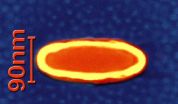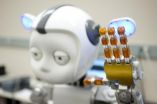(Press-News.org) Research by the University of Liverpool has found that systemic inflammation caused by sepsis can be suppressed by a protein which occurs naturally in a type of roundworm.
Sepsis is a serious inflammatory condition, caused by the body over-reacting to infection. The body becomes overwhelmed by bacteria, setting off a series of reactions that lead to inflammation and clotting. It affects around 20 million people worldwide each year, and accounts for a large proportion of intensive care unit admissions.
For the past 30 years, sepsis has largely been treated by antibiotics and maintenance of blood flow. Despite these treatments - often complicated by antibiotic-induced liver injury or the presence of multi drug-resistant bacteria - mortality rates for those with severe illness who go into multi-organ damage and septic shock, remain as high as 50%. New treatments for septic shock are of high clinical need.
Findings by an international team, led by Professor Alirio Melendez, based at the University's Medical Research Council Centre for Drug Safety Science in the Institute of Translational Medicine, show that inflammation triggered by bacterial endotoxins in immune cells from patients with sepsis is suppressed by a protein called ES-62 which is secreted by a type of roundworm called Acanthocheilonema viteae.
Roundworms can infect the human digestive tract, lymphatic vessels, skin and muscle. They are extremely common - particularly in parts of the world with poor sanitation - and it is estimated that nearly a quarter of the world's population are currently infected. Roundworm can live in the human body for decades without adverse effects or triggering the immune system.
Scientists already know that the protein secreted by roundworm is capable of suppressing inflammation and people infected with worms usually benefit from reduced inflammation if they suffer from conditions such as allergies and autoimmune diseases.
Professor Melendez explained: "The protein secreted by the roundworm stimulates a process called autophagy, a process of 'self-eating' that is essential to clear damage to cellular proteins or organelles and promote cell survival and function during stress situations.
"Autophagy reduces inflammation but at the same time permits the clearance of microbial infection. The findings suggest that ES-62 could be used to induce autophagy and reduce the overwhelming inflammation that is responsible for the massive tissue damage seen in sepsis."
He added: "ES-62 has the therapeutic ability to enhance recovery in septic shock by suppressing and limiting catastrophic inflammatory responses while allowing for bacterial clearance to occur. Administration of ES-62, or a synthetic small molecule derivative, alone or in combination with antibiotics could potentially be used treatment of septic shock as well as other inflammatory diseases."
###
The research is published in Nature Immunology and was carried out in collaboration with colleagues from the Universities of Strathclyde, Glasgow and the National University of Singapore.
Roundworm could provide new treatment for sepsis
2011-03-09
ELSE PRESS RELEASES FROM THIS DATE:
Big games, close scores lead to more auto fatalities for winning fans
2011-03-09
Closely contested major sporting events are followed by a significant increase in traffic fatalities for fans of the winning team, according to new research from North Carolina State University. It turns out there may be more on the line than many sports fans bargained for.
"A previous study showed that traffic fatalities increased in the hours following the Super Bowl. We wanted to see if that held true for other high-profile sporting events and, if so, whether the number of fatalities was influenced by whether the game was a close one," says Dr. Stacy Wood, Langdon ...
Rituximab combined with a TNF inhibitor and methotrexate shows no safety signal in RA treatment
2011-03-09
A recent trial of rituximab in combination with a tumor necrosis factor (TNF) inhibitor and methotrexate (MTX) in patients with active rheumatoid arthritis (RA) found the safety profile to be consistent with other RA trials with TNF inhibitors. While the trial reported no new safety risks, clear evidence of an efficacy advantage in RA patients receiving the combination therapy was not observed in this study sample. Results of the trial are published in the March issue of Arthritis & Rheumatism, a peer-reviewed journal of the American College of Rheumatology.
The National ...
Sildenafil reduces Raynaud's frequency in patients with systemic sclerosis
2011-03-09
Researchers in Europe reported that treatment with modified-release sildenafil significantly reduced the frequency of attacks of Raynaud's phenomenon in patients with limited cutaneous systemic sclerosis (lcSSc), also known as scleroderma. The double-blind, placebo-controlled trial found that sildenafil was well tolerated with only some subjects experiencing minor or moderate side effects. Full findings are available in the March issue of Arthritis & Rheumatism, a journal published by Wiley-Blackwell on behalf of the American College of Rheumatology (ACR).
Raynaud's ...
Scanning antiquity underfoot
2011-03-09
According to rough estimates, there are some 20,000 undiscovered archaeological sites in Israel waiting to be explored. Currently buried under highways or beneath cities, some could reveal historic monuments from the biblical past and give us clues to the expansion and settlement of modern man as he made his way through the Fertile Crescent.
But where to begin? Who decides which sites should be "dug" — at considerable financial cost — and which should remain unexplored until a later date? A new tool from Prof. Lev Eppelbaum of Tel Aviv University's Department of Geophysics ...
New bowel cancer evidence calls for routine DNA repair test
2011-03-09
Bowel cancer patients whose tumors contain defects in specific DNA repair systems are much less likely to experience tumour recurrence post surgery, results from a major clinical study have demonstrated.
Scientists who collaborated on the 10 year QUASAR randomised control trial, one of the largest UK clinical trials to test the benefits of chemotherapy in post-surgery bowel cancer patients, have confirmed that colon tumors containing defects in their DNA mismatch repair system are 50 percent less likely to recur following surgery compared to tumors where DNA mismatch ...
Malaria's weakest link
2011-03-09
A group of researchers from EPFL's Global Health Institute (GHI) and Inserm (Institut National de la Santé et de la Recherche Médicale, the French government agency for biomedical research) has discovered that a class of chemotherapy drugs originally designed to inhibit key signaling pathways in cancer cells also kills the parasite that causes malaria. The discovery could quickly open up a whole new strategy for combating this deadly disease.
The research, published online in the journal Cellular Microbiology, shows that the malaria parasite depends upon a signaling pathway ...
Study: Homeless patients cost $2,500 more than the average patient for each hospital stay
2011-03-09
TORONTO, ON., March 8, 2011—Homeless patients cost about $2,500 more per hospital stay than the average patient, according to a new study by researchers at St. Michael's Hospital.
Homeless people with medical or surgical problems arrive at the hospital with underlying health issues and stay longer than others, often because there is no place to send them after their initial medical crisis has been treated, the study found. Those with psychiatric illness arrive at the hospital much sicker than others.
The findings suggest the cost of hospitalizing people who are homeless ...
Extremely fast MRAM data storage within reach
2011-03-09
This release is available in German.
Magnetic Random Access Memories (MRAM) are the most important new modules on the market of computer storage devices. Like the well known USB-sticks, they store information into static memory, but MRAM offer short access times and unlimited writing properties. Commercial MRAMs have been on the market since 2005. They are, however, still slower than the competitors they have among the volatile storage media. An invention made by the Physikalisch-Technische Bundesanstalt (PTB) changes this situation: A special chip connection, in association ...
How can robots get our attention?
2011-03-09
Getting someone's attention can be easy with a loud noise or a shout, but what if the situation calls for a little more tact? How can a robot use subtle cues to attract a human's notice and tell when it has captured it? In a preliminary study, researchers at the Georgia Institute of Technology have found that they can program a robot to understand when it gains a human's attention and when it falls short. The research is being presented today at the Human-Robot Interaction conference in Lausanne, Switzerland.
"The primary focus was trying to give Simon, our robot, the ...
Earth: Alive -- bacteria back from the brink
2011-03-09
Alexandria, VA – In 1993, "Jurassic Park" thrilled the world with the idea that dinosaurs could be resurrected from bits of DNA preserved in mosquitoes trapped in ancient amber. In the 18 years since the movie came out, scientists have been finding that parts of this scenario are closer to reality than anyone ever imagined: Researchers have found microbes living for tens of thousands - and maybe millions - of years inside salt crystals.
These findings raise exciting questions, as EARTH explores in "Bacteria Back From the Brink" in the April issue. Could these hibernating ...

